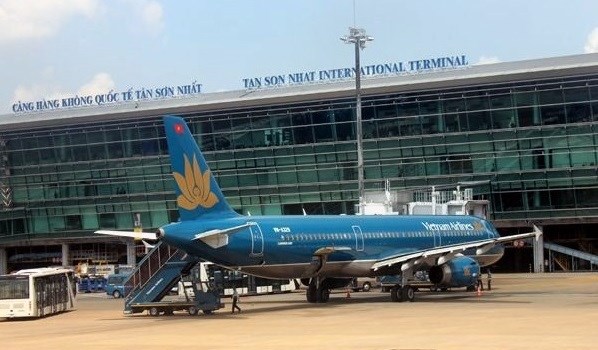 Society
Society


|
| A Vietnam Airlines aircraft at Tân Sơn Nhất international airport in HCM City. The aviation industry is facing a human resource shortage. VNA/VNS Photo |
HCM CITY — The aviation industry is facing a severe human resource shortage due to several factors such as the recovery of the tourism sector and the expansion of airports across the country, experts said.
Trần Thị Thái Bình, head of the Vietnam Aviation Academy’s Air Transport Economics Department, said there is significant demand for aviation professionals in major airports such as Tân Sơn Nhất, Nội Bài, the under-construction Long Thành airport, and others, as well as in airline companies.
The aviation industry currently employs around 44,000 individuals in transportation, port and flight operations. But the workforce is insufficient to meet the industry’s growing demands, she said.
The demand for human resources will continue to rise, especially from 2023 to 2030, she noted.
In addition to airport expansions, passenger numbers are gradually recovering.
In the first half of this year, Việt Nam saw a 30 per cent increase in passengers, according to a report by the Airports Corporation of Vietnam (ACV).
International passengers exceeded 14.4 million, almost five times higher than in the same period last year, according to the report.
Domestic and international airlines operated nearly 365,000 flights in the first half, up 18 per cent year-on-year, with over 99,200 international flights, up 150 per cent year-on-year.
Dr. Bùi Song Thu, director of the Research Institute, said the industry will face a shortage of personnel in areas such as airport supervision, ground operations management, aircraft engineering, aircraft maintenance, and pilots.
According to a report by the International Air Transport Association (IATA), the aviation workforce needs to develop rapidly to handle a two to four-fold increase in passengers over the next two decades.
Lương Thị Xuân, founder of Việt Nam’s first Aviation Exhibition and CEO of the Aviation Exhibition Joint Stock Company, said the shortage of human resources is not only a matter of quantity but also of quality and expertise.
The Vietnam Aviation Academy has announced plans to provide training in over 20 majors at both undergraduate and postgraduate levels, covering all activities such as technical practices, aviation operations, transportation economics, and aviation services.
In the 2022-2023 academic year, it aims to admit 2,635 students, including 119 students majoring in flight operations and 106 students in aviation engineering.
But the numbers fall significantly short of the total demand in the market.
In terms of pilots, Việt Nam only has the Viet Flight Training school, which trains less than 100 pilots annually.
Several private aviation companies have started offering training in high-quality specialised fields, but they have not adequately met the demand.
Limited admission quotas and unappealing majors are also contributing factors to the shortage.
Tạ Minh Trọng, director of Flight Safety Standards at Civil Aviation Authority of Vietnam, said professionals with an elementary-level certificate in the aviation industry can earn a salary of VNĐ15-20 million (US$650-870) per month.
Those with B1 and B2 licenses (aircraft maintenance technician certificates) and the ability to approve completed maintenance work can earn up to VNĐ50 million (around $2,170) or more per month.
However, the lengthy study period and high cost make recruitment for the industry challenging, he noted.
The Vietnam Aviation Academy has announced plans to focus on researching applications in aircraft maintenance training and training for safe aircraft parking using specialised equipment.
Dr. Hà Nam Khánh Giao, deputy director of the Vietnam Aviation Academy, recommended Việt Nam collaborate with foreign universities and training institutes to send students abroad for education.
According to a report by IATA, the aviation transport sector could grow by 178 per cent over the next 20 years if it follows pre-pandemic trends.
If realised, the industry could contribute $35 billion to the economy and benefit 2.4 million workers, said the report. — VNS




